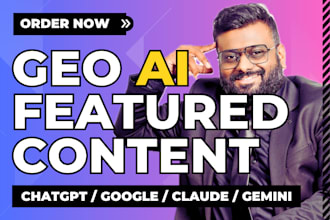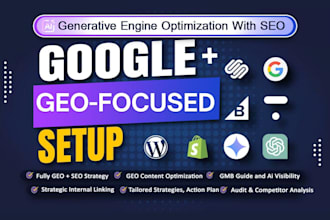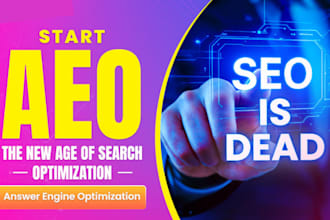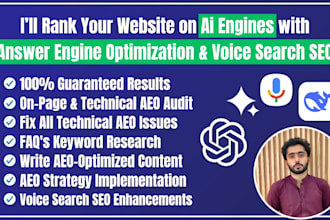What is Generative Engine Optimization (GEO)?
Generative Engine Optimization (GEO) is the practice of optimizing your content so it can be featured in AI-generated responses, much like SEO but for artificial intelligence platforms. This means structuring and refining your website or copy in a way that AI-driven “engines” (e.g., ChatGPT, Google Bard/Gemini) recognize it as a high-quality source. The goal of GEO is to make your content the one that AI systems choose to quote or cite when answering user queries, thereby boosting your visibility in voice assistants, chatbots, and other AI-powered search tools.How much do GEO services cost on Fiverr?
GEO services on Fiverr range widely in price depending on the provider’s expertise and the project scope. Basic GEO gigs (e.g, optimizing a single blog post with AI-driven techniques) often start around $150 for a starter package. On the higher end, comprehensive GEO packages from top-rated or Pro sellers, including full site optimization and ongoing AI-focused SEO strategy, can cost up to $5,000 or more. Most sellers offer tiered packages (Basic, Standard, Premium), so you can choose a plan that fits your budget and goals while still getting the benefit of improved AI visibility.Why is GEO important?
GEO is becoming crucial as search behavior shifts toward AI. More people are discovering brands and content through AI chat interfaces and voice assistants rather than traditional search alone. If your content isn’t optimized for generative engines, it may not appear in the answers that AI platforms provide, causing you to miss out on traffic and visibility. In an AI-first world, implementing GEO helps ensure your business stays discoverable and competitive, keeping you ahead of the curve as technologies like ChatGPT and similar tools gain even more traction.How does GEO improve AI visibility and content discoverability?
GEO improves your content’s visibility on AI-driven platforms by tailoring it to how AI algorithms understand and select information. It ensures your pages are highly relevant, authoritative, and easy for AI to digest, making them more likely to be pulled into AI-generated answers. In practice, this means your website or content can reach users on AI platforms (like chatbot responses or AI-powered search results) in addition to traditional search engine listings. By aligning your content with AI preferences – such as clear structure, rich context, and relevant keywords – GEO boosts discoverability, helping your brand get noticed when users ask questions to AI systems.Can GEO help my content rank higher in AI-generated results?
Think of GEO as SEO for AI – it can absolutely help your content (or even prompts you use in AI-driven content) rank higher or be more prominently featured when an AI generates an answer. GEO techniques increase the chances that an AI (from ChatGPT to emerging “answer engines”) will recognize your content as the best match for a given query. In effect, when someone asks a question on an AI platform, effective GEO makes it more likely the AI will draw from your content and even credit your brand as a source. This is how GEO influences “prompt ranking”: by optimizing content elements that AI models consider, it helps your material rise to the top in AI outputs.What techniques do GEO experts use to optimize content for AI?
GEO experts use a blend of technical SEO and AI-focused strategies to make content more AI-friendly. Key techniques include:
Natural Language Processing & Semantic SEO: Using AI tools to expand keyword coverage and ensure your content covers topics the way an AI expects (contextually and semantically).
AI Prompt Engineering: Structuring content (headlines, FAQs, summaries) so that it’s easily interpretable and quotable by AI models, increasing the likelihood your content is used in answers.
Metadata & Structured Data Optimization: Adding schema markup, clear meta titles/descriptions, and other structured data so AI algorithms can parse your content and context with ease.
Quality & Credibility Enhancements: Updating the content to be authoritative and clear, for example, citing reputable sources, incorporating relevant facts/quotes, and polishing language for clarity. This boosts your content’s reliability and makes it more attractive for AI to pick up.


















